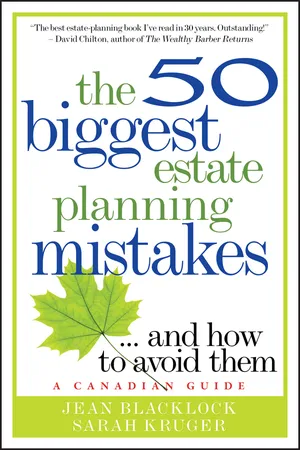![]()
PART 1
incompetency issues
![]()
WANTED: DEAD OR ALIVE!
MISTAKE # 1
Failing to face the need to delegate your decision-making ability while you are still able to do so
AS WE RESEARCHED THE BOOK, this very first mistake of not planning for the possibility of mental incapacity was mentioned time and again in a heartfelt way. In speaking to us about being the delegated decision maker for his own mom, one seasoned trust professional said, “You know, I even had to decide if she should have a flu shot! Even though I have been in the trust and estate business for years, I had no idea what was really involved in the incompetency part of it. I wish Mom and I had talked about her views on the end of life before she became senile.”
Making the mistake of not planning for incompetency is entirely normal in our society. We like to avoid thinking about being senile even more than we like to avoid thinking about our death. Flipping through a friend’s photos of the River Ganges—where some of India’s sick and elderly choose to die—makes us shudder and switch to talking about those Flames . . . or those Leafs . . . or how we got the bubble gum off the carpet!
In 2009, the Alzheimer Society of Canada released research noting that Alzheimer’s disease and related dementias are not normal parts of aging and yet even so, in 2009, 1 in 11 Canadians over the age of 65 had Alzheimer’s disease or some form of mental disorder. As the baby boomers age, the relative number will, of course, increase: playing a guessing game as to whether any of us will be personally affected is not a smart move.
The good news is that the incompetency hand is a much better hand to play if you plan in advance. With that in mind, Part 1 of the book covers the mistakes you will want to avoid in planning for a time of possible mental incompetency in your life.
In this first mistake, let’s cover some basic principles and set out the shorthand terminology we’ll use for ease of reading.
basic principles to know and keep in mind
1. Planning ahead and preparing the required documentation for a possible time of incompetency does not mean that you will lose control now against your wishes. In fact, with health care delegation, the delegation cannot come into effect unless and until it is determined that you are incapable of making the required decisions on your own. Our legal system is (thankfully) based on the notion that people should be free to make their own decisions as long as they wish to and are able to do so.
2. The reluctance of the law to interfere with the decision-making ability of a person and the recognition that personal care decisions are different from property or financial decisions have resulted in legislation across Canada, which in most, although not all, provinces sets out separate processes and documents for the two types of decisions: those decisions that are personal in nature—like health, grooming and diet—and those that affect property and financial matters.
3. For simplicity throughout the book, we use the term power of attorney to mean a document that is valid in your province for the appointment of a delegated decision maker for your financial affairs. And no, your attorney doesn’t need a law degree: the word attorney in this term means agent rather than lawyer.
4. Also for simplicity, we will use the term personal directive to mean a document that is valid in your province for the appointment of a delegated decision maker who will make all the decisions about your health and personal care, such as where to live, diet, medications, medical treatments and so on.
5. A power of attorney can come into effect as soon as it is signed, if you want, and continue for whatever time period you like. If you are going to Europe and want to sell your house while travelling, you may sign a power of attorney appointing an attorney that is effective for, say, two weeks. Alternatively, and more commonly, a power of attorney can either become effective when it is signed and continue past the occurrence of mental incompetency until the date of death or it can become effective later (maybe when two physicians declare in writing that mental incompetency has occurred) and continue until the date of death. (Deciding which way to go will be part of the discussions you have with your lawyer. The document you sign will then reflect your wishes.)
No matter what you decide to do in your power of attorney and personal directive, if the day comes that you do indeed need some decisions made for you, it may be comforting to know that our laws reflect the belief that a person’s decision-making ability is not a simple thing to assess. Comparing the decisions that we make every day for ourselves across a range of topics is not comparing “apples to apples”: it is more challenging for a surgeon to carry out open heart surgery than to decide which birthday cake to make for her child. This lifelong reality is taken into consideration when a person’s mental abilities begin to diminish. For example, 85-year-old Mary may no longer interact effectively with her investment advisor, but she may certainly be capable of deciding what she wants to wear when she goes out to dinner and what to order once she gets there.
As the next few chapters indicate, it is not as difficult to plan for the possibility of incompetency in your future as you may imagine; instead, it is an aspect of your estate planning that you can think about and plan for one step at a time.
points to take away
• Right now in our North American society, we are really not comfortable with talking about being incompetent. We would prefer to die peacefully in our sleep—or keel over while hitting a hole in one!
• The benefits to planning ahead for mental incompetency outweigh the difficulty of the process: legislation on the subject in most provinces is designed with simplicity in mind.
• Two types of advance planning need to be covered: one for property-related decisions and one for personal care decision making.
![]()
OKAY, SO LET’S SAY I’M ALIVE
MISTAKE # 2
Not knowing how to plan in advance for possible incompetency
REALLY, THE MISTAKE we’re talking about here is simply mentally blocking out the task of planning ahead for incompetency because (a) it is not at all fun to think about being dependent on anyone; and (b) the terms we introduced in Mistake #1 like power of attorney and personal directive sound unfamiliar and daunting.
Luckily, once you have done the thinking about what you would want to happen if you became incompetent, the actual doing with the assistance of your lawyer is relatively straightforward. As the provinces have developed and updated the relevant legislation over the years, they have been guided by the suggestions of practising lawyers and judges and have tried to make this area of the law as user-friendly as possible.
financial matters
The only person who can delegate your decision-making authority over your property and your money is you, and you do this via the document we introduced in Mistake #1, a power of attorney. (One lawyer we interviewed mentioned that it bothers her when people say, “I am the power of attorney for my dad” when in fact the correct reference is, “I am the attorney for my dad, under a power of attorney,” since a power of attorney is merely a document and the attorney is the person named in it. But we digress . . .)
If you don’t sign a power of attorney and you do one day need someone to make financial and property decisions for you, all is not lost but the solution comes at a price. Someone in your inner circle of loved ones will need to make a court application and then the court will appoint a delegated decision maker over your property and finances. So the “price tag” includes the extra cost, confusion, and time and effort involved in any type of court application.
An additional frustration with this solution is that the purpose of the court application is to do what could have been done in advance by you when you were competent: name a trusted person or persons to look after your financial affairs.
The court-appointed person may not be the person you would have chosen on your own. For example, it may end up being your son, Bert, who lives close by you, but if you had your druthers, your daughter, Susan, would be a better choice. If you had only turned your mind to it when you were able to decide this matter for yourself, you could have chosen her instead. In the worst-case scenario for a court application, Bert and Susan both want the job and are pitted against each other before the period of attorneyship even starts. Or maybe neither wants the role. In this case if you had talked to them about it yourself, you could have addressed the situation by asking your nephew, Joe, to be your attorney.
personal care and medical decisions
When talking about the delegation of personal and health care decisions, if you have not planned ahead and done a personal directive, provincial legislation sets out the people, in descending order of priority, who have the authority to be appointed by a court to make such decisions on your behalf. As in the case of a court application to appoint a decision maker for financial matters, the appointment by the court of a decision maker on health and personal care decisions is a “coulda, woulda, shoulda been avoided” situation that comes at the price of extra time and expense.
If the situation is a medical emergency, there really can be a problem. If there is no personal directive in place and no time for a court application to appoint one or two people as the decisions makers, the presiding physicians may need to consult a number of people who are all in the same category. For example, let’s say the doctors need to know if risky bypass surgery should proceed and they need to have that decision made by the category of people with the highest priority to make such decisions. Let’s also say that in this example the closest relatives are the adult children. If there are five children who don’t get along, they can be feuding in the hospital waiting room for quite some time while the physicians await their decision.
If you think emotional disputes in hospital waiting areas only happen on the Jerry Springer show and never in Canada, hold on a minute—over his many years as a geriatrician, Dr. Michael Gordon, currently the Medical Program Director for Palliative Care at the Baycrest Geriatric Health Care System and one of Canada’s best known figures in geriatric medicine, has seen and heard it all from families, some good, and some frankly pretty sad.
In Dr. Gordon’s experience, cases do arise where the kids of an incompetent person just can’t get it together to make a decision. Often, when they are told that the next step will be for the hospital to ask the appropriate authority in the provincial government to make a decision, they are galvanized to sort it out before that becomes necessary.
Nevertheless extreme situations do occur, where authorities in the province are indeed asked to make an important medical decision and they will do just that, as authorized and directed by law. After this has happened, the family can try to re-assert its position as decision maker through further court applications or dispute resolution, but certainly some valuable time and family dignity will be lost.
points to take away
• Provincial legislation directs how residents of the province can plan in advance for an alternate decision maker for financial matters by way of a power of attorney, and in matters related to personal care and medical decisions by way of a personal directive. (As we noted in Mistake #1, the terminology used and the specifics of the legislation vary across Canada.)
• If you choose not to plan ahead for a time of possible incompetency, you will not be left high and dry, but the required court process to appoint one or more decisions makers will take time and money.
• There is also the possibility that a court application will involve needless uncertainty and conflict among your family and close friends, and the chance that someone will be appointed who you would not have personally selected as your decision maker.
![]()
JUST GIVE ME CHERRY GARCIA ICE CREAM
MISTAKE # 3
Failing to leave a road map for making your personal care decisions and not communicating clearly with your chosen substitute decision maker
SOME ESTATE-PLANNING MISTAKES cost money, some mistakes break hearts. This mistake is in the latter group because not talking about how you think and feel about personal care and health care can leave your loved ones distraught and guilt-ridden.
People glibly say things like, “My kids know they should put me in a home when the day comes,” but we wonder, Have you really had that conversation? Have you written that down in a personal directive? It is one thing to think we know what our dear mother would want to happen—and quite another to see it in writing. Anyone named as a substitute decision maker in a personal directive is often grateful to see any type of specific written directions to guide his decision and ease his mi...



